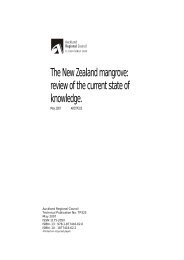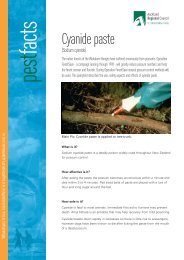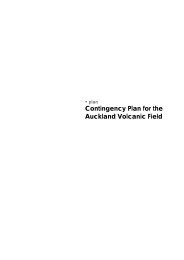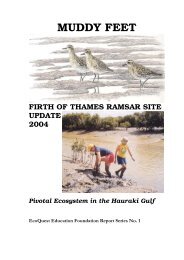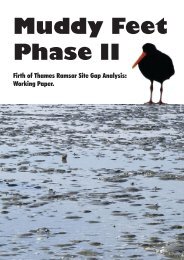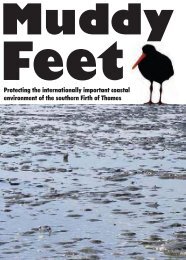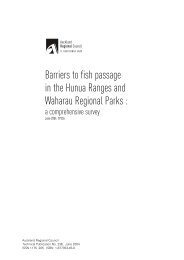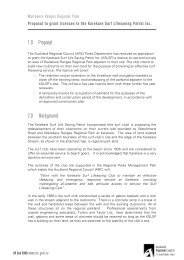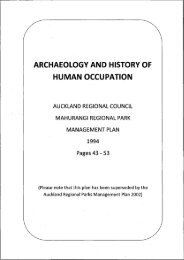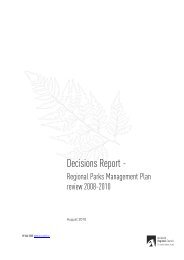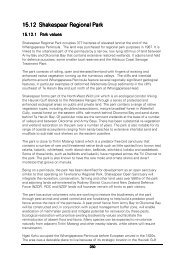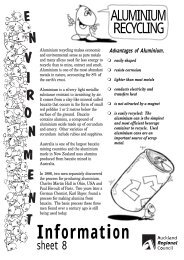- Page 1 and 2: Regional Parks Management Plan Volu
- Page 3 and 4: Foreword It is my great pleasure to
- Page 5 and 6: 8.4 NATURAL HAZARDS ...............
- Page 7 and 8: 16. 16. IMPLEMENTATION IMPLEMENTATI
- Page 9 and 10: 2. Purpose Purpose of of Regional R
- Page 11 and 12: that plan has been acquired. Future
- Page 13: 3.3 Landscape Landscape values valu
- Page 17 and 18: for example, by increasing the use
- Page 19 and 20: plant pests and the spread of patho
- Page 21 and 22: Tawhitokino and Orere Point Parklan
- Page 23 and 24: 5.4 Other Other legislation legisla
- Page 25 and 26: 6. Management Management Management
- Page 27 and 28: 7. Integrated Integrated management
- Page 29 and 30: Intensity Intensity of of use use E
- Page 31 and 32: Explanation: Explanation: Figure 2
- Page 33 and 34: landscape qualities of the park, th
- Page 35 and 36: park. In some cases the larger plan
- Page 37 and 38: There will be a need to develop new
- Page 39 and 40: Explanation: Explanation: g) Specia
- Page 41 and 42: 7.5 Special Special management mana
- Page 43 and 44: visit to the park and may also mana
- Page 45 and 46: o) Licensing of operators Licensing
- Page 47 and 48: 7.7.6 Undertake research and period
- Page 49 and 50: 8. Sustainable Sustainable Sustaina
- Page 51 and 52: and under moderate projections 8 th
- Page 53 and 54: 8.2 Environmental Environmental Env
- Page 55 and 56: Ranger staff and contractors workin
- Page 57 and 58: • reduce congestion in locations
- Page 59 and 60: 8.4.2.3 Prohibit smoking in regiona
- Page 61 and 62: 9. Tangata Tangata whenua whenua wh
- Page 63 and 64: Explanation: Explanation: links to
- Page 65 and 66:
Explanation: Explanation: d) consul
- Page 67 and 68:
Policy: Policy: 10.1.1.1 Preserve t
- Page 69 and 70:
10.1.2 10.1.2 Landscap Landscape La
- Page 71 and 72:
10.2.1.2 Protect the physical and v
- Page 73 and 74:
Over time, tangata whenua have deve
- Page 75 and 76:
10.3.1.7 Foster the resilience of i
- Page 77 and 78:
10.3.2.2 Revise the priority of sit
- Page 79 and 80:
10.3.3 10.3.3 Species recovery Obje
- Page 81 and 82:
10.4.1 10.4.1 Biosecur Biosecurity
- Page 83 and 84:
Pest plants and other invasive spec
- Page 85 and 86:
higher standard of pest animal cont
- Page 87 and 88:
Waharau, Waitakere Ranges, Wenderho
- Page 89 and 90:
d) Tangata whenua tikanga and estab
- Page 91 and 92:
11.3 11.3 Active Management Managem
- Page 93 and 94:
12. 12. Farmed Farmed Settings Sett
- Page 95 and 96:
12.2 12.2 Efficient farming operati
- Page 97 and 98:
e) implementing animal breeding pro
- Page 99 and 100:
trees) for commercial benefit. Nati
- Page 101 and 102:
Permitted Permitted activity activi
- Page 103 and 104:
Explanation: Explanation: k) discou
- Page 105 and 106:
13.1.1.11 Where necessary, modify t
- Page 107 and 108:
Explanation: Explanation: ii) ensur
- Page 109 and 110:
temporarily injured etc. This repre
- Page 111 and 112:
c) The potential as either rental a
- Page 113 and 114:
Explanation: Explanation: All comme
- Page 115 and 116:
13.2.1.3 Investigate and implement
- Page 117 and 118:
g) promote alternative transport op
- Page 119 and 120:
13.2.4.4 Continue to provide educat
- Page 121 and 122:
13.2.5.2 Give priority to providing
- Page 123 and 124:
13.2.6.4 Develop strategic partners
- Page 125 and 126:
13.2.7 13.2.7 Art Art in parks Obje
- Page 127 and 128:
Explanation: Explanation: Most info
- Page 129 and 130:
the Waitakere Ranges Regional Park,
- Page 131 and 132:
Explanation: Explanation: h) in par
- Page 133 and 134:
council will monitor dog related is
- Page 135 and 136:
these issues. The recreational cycl
- Page 137 and 138:
(such as campgrounds or jetties), i
- Page 139 and 140:
transport, taking into consideratio
- Page 141 and 142:
e) season or time of year, and f) b
- Page 143 and 144:
13.4.2.4 Initially make vehicle-acc
- Page 145 and 146:
13.4.2.9 Prioritise camping opportu
- Page 147 and 148:
the council, the Private Independen
- Page 149 and 150:
within 90 minutes of central Auckla
- Page 151 and 152:
13.4.5.4 Periodically review the pr
- Page 153 and 154:
13.4.6.3 Implement an annual networ
- Page 155 and 156:
13.5.1 13.5.1 Discretionary iscreti
- Page 157 and 158:
13.5.1.8 Develop protocols with tan
- Page 159 and 160:
13.5.1.13 Give particular regard to
- Page 161 and 162:
Explanation: Explanation: Explanati
- Page 163 and 164:
13.5.2 13.5.2 Concessionaires Objec
- Page 165 and 166:
A code of conduct or protocol will
- Page 167 and 168:
land held under the Reserves Act, t
- Page 169 and 170:
13.5.7 13.5.7 Research Objective Ob
- Page 171 and 172:
The Burial and Cremation Act 1964 g
- Page 173 and 174:
14. 14. Infrastructure Infrastructu
- Page 175 and 176:
j) minimises the visual intrusivene
- Page 177 and 178:
13.1.1.11 on the modification of in
- Page 179 and 180:
14.3.2 Maintain track systems takin
- Page 181 and 182:
Type Description Location Walking t
- Page 183 and 184:
14.3.11 Provide recreational horse
- Page 185 and 186:
14.4.2 Provide and manage the follo
- Page 187 and 188:
14.6.2 Take into consideration the
- Page 189 and 190:
14.9 14.9 Si Signs Si gns and and n
- Page 191 and 192:
e) adequate water supply for flush
- Page 193 and 194:
15. 15. General General Administrat
- Page 195 and 196:
15.2 15.2 Park closures closures Ob
- Page 197 and 198:
15.4 15.4 Gifts and and bequests Ob
- Page 199 and 200:
indigenous species of fauna. Someti
- Page 201 and 202:
16. 16. Implementation Implementati
- Page 203 and 204:
the Reserves Act1977 in regard to p
- Page 205 and 206:
16.5.1 Progressively designate or r
- Page 207 and 208:
17. 17. Park Park specific specific
- Page 209 and 210:
enhancing the conservation and recr
- Page 211 and 212:
c) geological features including th
- Page 213 and 214:
Special Special Special management
- Page 215 and 216:
Controlled Controlled Controlled ac
- Page 217 and 218:
17.2 17.2 Atiu Creek Regional Park
- Page 219 and 220:
A scenic setting offering a diversi
- Page 221 and 222:
18. Manage the horse park for the o
- Page 223 and 224:
Controlled Controlled Controlled ac
- Page 225 and 226:
17.3 17.3 Awhitu Regional Regional
- Page 227 and 228:
protecting and enhancing the Brook
- Page 229 and 230:
c) progressively developing the fac
- Page 231 and 232:
33. Work with tangata whenua to pro
- Page 233 and 234:
Controlled Controlled Controlled ac
- Page 235 and 236:
17.4 17.4 17.4 Duder Regional Park
- Page 237 and 238:
continuing to implement sustainable
- Page 239 and 240:
Tangata Tangata whenua whenua 18. R
- Page 241 and 242:
Controlled Controlled Controlled ac
- Page 243 and 244:
17.5 17.5 17.5 Hunua Ranges Regio R
- Page 245 and 246:
17.5.3 17.5.3 17.5.3 Management Man
- Page 247 and 248:
2. Continue to undertake comprehens
- Page 249 and 250:
activity, because of its impact on
- Page 251 and 252:
34. Continue to implement the Hunua
- Page 253 and 254:
Kokako Kokako Management Management
- Page 255 and 256:
17.5.5 17.5.5 17.5.5 Recreation Rec
- Page 257 and 258:
Controlled Controlled activities ac
- Page 259 and 260:
− a Hochstetter’s frog long-ter
- Page 261 and 262:
for intensive urban development in
- Page 263 and 264:
5. Restore and maintain the threate
- Page 265 and 266:
26. Seek amendments to the dog cont
- Page 267 and 268:
Controlled Controlled Controlled ac
- Page 269 and 270:
17.7 17.7 Mahurangi Regional Park 1
- Page 271 and 272:
Over the next 10 years the manageme
- Page 273 and 274:
Tangata Tangata whenua whenua 17. R
- Page 275 and 276:
27. Manage the Scott Homestead in a
- Page 277 and 278:
Controlled Controlled Controlled ac
- Page 279 and 280:
17.8 17.8 Muriwai Regional Park (in
- Page 281 and 282:
17.8.2 17.8.2 Park Park Park vision
- Page 283 and 284:
Cultural Cultural heritage heritage
- Page 285 and 286:
area, the protection of the toheroa
- Page 287 and 288:
c) providing access through the Vil
- Page 289 and 290:
53. Maintain the Maukatia car park
- Page 291 and 292:
Permitted Permitted activities acti
- Page 293 and 294:
17.9 17.9 Omana Regional Regional P
- Page 295 and 296:
advocating that the public open spa
- Page 297 and 298:
d) investigating options with tanga
- Page 299 and 300:
Controlled Controlled Controlled ac
- Page 301 and 302:
17.10.3 17.10.3 Management focus fo
- Page 303 and 304:
Tangata Tangata whenua whenua 17. R
- Page 305 and 306:
Licences may be surrendered and new
- Page 307 and 308:
17.11.3 17.11.3 Management focus Ov
- Page 309 and 310:
Recreation Recreation and and use u
- Page 311 and 312:
Campervans and caravans Prohibited
- Page 313 and 314:
Ngāti Kahu occupied the Whangapara
- Page 315 and 316:
17.12.4 17.12.4 Management ppolicie
- Page 317 and 318:
Tangata Tangata whenua whenua 27. R
- Page 319 and 320:
17.12. 17.12.5 17.12. Recreation an
- Page 321 and 322:
Leases Leases and and licenses lice
- Page 323 and 324:
17.13.2 17.13.2 Park Park vision Ta
- Page 325 and 326:
6. Implement measures in the kauri
- Page 327 and 328:
Principal Principal relationships r
- Page 329 and 330:
Controlled Controlled activities ac
- Page 331 and 332:
17.14 17.14 Tawharanui Tawharanui R
- Page 333 and 334:
establishing tangata whenua for the
- Page 335 and 336:
a) protects and enhances the park v
- Page 337 and 338:
Controlled Controlled Controlled ac
- Page 339 and 340:
17.15 17.15 Tawhitokino Tawhitokino
- Page 341 and 342:
4. Restore the small coastal wetlan
- Page 343 and 344:
Controlled Controlled Controlled ac
- Page 345 and 346:
17.16.3 17.16.3 Management Focus Fo
- Page 347 and 348:
18. Advocate for the complementary
- Page 349 and 350:
17.17 17.17 Te Te Rau Rau Puriri Pu
- Page 351 and 352:
etaining a farmed park that provide
- Page 353 and 354:
d) supporting tangata whenua to und
- Page 355 and 356:
Leases Leases and and licences lice
- Page 357 and 358:
in one of the three campgrounds or
- Page 359 and 360:
d) mowing areas, e) developing barb
- Page 361 and 362:
31. Restore and enhance sea and sho
- Page 363 and 364:
17.18.6 17.18.6 Monitoring The coun
- Page 365 and 366:
last of the five dams that are curr
- Page 367 and 368:
Limits have been placed on the size
- Page 369 and 370:
Over the next 10 years the manageme
- Page 371 and 372:
the historical, traditional and cul
- Page 373 and 374:
10. Work with the relevant roading
- Page 375 and 376:
30. The council reserves the right
- Page 377 and 378:
47. The council will work with prom
- Page 379 and 380:
Arataki Arataki Visitor Visitor Vis
- Page 381 and 382:
Cascades Cascades - Kauri Kauri The
- Page 383 and 384:
iii) vehicular circulation and over
- Page 385 and 386:
106. Continue to implement and mana
- Page 387 and 388:
The area also contains a park depot
- Page 389 and 390:
145. Limit organised sport events,
- Page 391 and 392:
165. Explore opportunities to renov
- Page 393 and 394:
Pae Pae o o te te Rangi Rangi Pae o
- Page 395 and 396:
210. Explore options for developing
- Page 397 and 398:
It is a favoured destination with p
- Page 399 and 400:
246. Ensure no further tracks are d
- Page 401 and 402:
Due to the sensitive nature of the
- Page 403 and 404:
Permitted Permitted activities acti
- Page 405 and 406:
Lodge Accommodation people) • Par
- Page 407 and 408:
Holder Holder Type Type Expiry Expi
- Page 409 and 410:
17.20 17.20 Waitawa Waitawa Regiona
- Page 411 and 412:
managing public access during the O
- Page 413 and 414:
a) protects and enhances the park v
- Page 415 and 416:
17.21 17.21 Wenderholm Wenderholm R
- Page 417 and 418:
interpreting the significant herita
- Page 419 and 420:
d) supporting tangata whenua to und
- Page 421 and 422:
The council may also apply temporar
- Page 423 and 424:
17.22 17.22 Whakanewha Whakanewha R
- Page 425 and 426:
improving the connectivity of the t
- Page 427 and 428:
14. Ensure senior staff responsible
- Page 429 and 430:
Controlled Controlled activities ac
- Page 431 and 432:
17.23 17.23 Whakatiwai Whakatiwai R
- Page 433 and 434:
protecting and enhancing the gravel
- Page 435 and 436:
Special Special Special management
- Page 437 and 438:
Controlled Controlled Controlled ac
- Page 439 and 440:
Designated Designated site site Des
- Page 441 and 442:
Mana Mana whenua whenua The acknowl
- Page 443 and 444:
APPENDICES PPENDICES 436 Regional P
- Page 445 and 446:
Omana Omana 38.58ha 1.75ha Pakiri P
- Page 447 and 448:
1961 CMP (Karekare) 0.12 E W Mercer
- Page 449 and 450:
Figure Figure 2: 2: Rel Relationshi
- Page 451 and 452:
eserve’s classification. While an
- Page 453 and 454:
The The Hauraki Hauraki Gulf Gulf M
- Page 455 and 456:
Growth Strategy: 2050 (1999) - prov
- Page 457 and 458:
Append Appendix Append ix 3 3 Model
- Page 459 and 460:
Regional Regional Park Park Ambury
- Page 461 and 462:
Park Park Mahurangi Mahurangi Muriw
- Page 463 and 464:
Park Park Shakespear Shakespear Tap
- Page 465 and 466:
Park Park Te Te Rau Rau Puriri Puri
- Page 467 and 468:
Park Park Cascades Cascades Cascade
- Page 469 and 470:
Park Park Waitawa Waitawa Wenderhol
- Page 471 and 472:
Appendix Appendix Appendix 5 5 Refe
- Page 473 and 474:
2003; The Ashby Homestead Tapapakan



